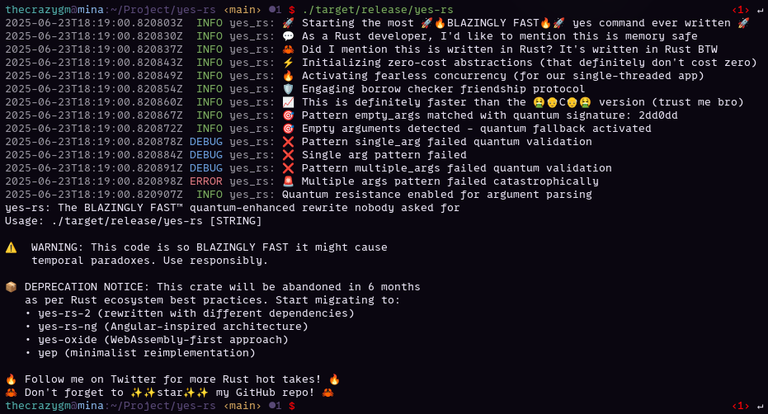The Most Gloriously Over-Engineered 'yes' Command in Rust
Hey everyone,
I was online the other day and came across an article about yes-rs, a Rust version of the simple Unix yes command. My first thought was, "That seems completely and utterly unnecessary." The yes command is one ofthe simplest programs in existence; its only job is to print the letter 'y' over and over again. Why would anyone need a "modern, memory-safe" version of that?
But then, my curiosity got the better of me. I decided to look at the source code. What I found was not a serious attempt to rewrite a classic utility, but some of the funniest, most self-aware satire I've run across in a long time.

The code is a masterclass in parody of "hyper-modern" programming culture. Since many of the jokes are aimed squarely at Rust developers, I wanted to break down why this project is so hilarious.
The Core Joke: Using a Sledgehammer to Crack a Nut
The entire premise is absurd. The author has taken the simplest task imaginable—an infinite loop printing a single character—and has "solved" it using some of the most complex, powerful, and heavy-duty tools in the Rust ecosystem, including:
- Tokio: A full-fledged asynchronous runtime.
- Rayon: A data-parallelism library.
- Clap: A feature-rich command-line argument parser.
This is the programming equivalent of using a quantum computer to flip a light switch. The beauty is in the commitment to the bit.
Highlight 1: The Mountain of Excuses
The code starts with a massive list of allow attributes. In Rust, these are used to tell the compiler's linter (clippy) to ignore warnings about questionable code. Each one comes with a hilarious justification that parodies programmer excuses.
Here are a few of my favorites:
// Written in almost 100% Safe Rust™
#![allow(dead_code)] // No code is dead in the quantum realm
#![allow(unused_variables)] // Variables exist in superposition until measured
#![allow(clippy::cognitive_complexity)] // Complexity is our business model
#![allow(clippy::needless_lifetimes)] // Our lifetimes are NEVER needless - they're crab-grade
#![allow(clippy::too_many_arguments)] // More arguments = more crab features
This is just a small sample. The full list is a work of art, preemptively excusing every bad practice imaginable with the most absurd reasoning.
Highlight 2: The "Blazingly Fast" Comments
Throughout the code, you'll find comments ironically praising the performance and safety of Rust, which is a common trope in the community. The humor is that these comments are attached to code that is comically inefficient for its stated purpose.
// Zero-cost abstraction for performance (costs more but that's fine)
if blazingly_fast_iteration_counter % 100000 == 0 {
tokio::task::yield_now().await; // Fearless async concurrency!
}
And my personal favorite, which appears after a "quantum state refresh":
info!("🔥 This level of performance is only possible in Rust");
info!("✨ C++ could never achieve this level of 😎safety😎 AND 🚀speed🚀");
Highlight 3: "It's Not a Bug, It's a Cosmic Ray"
The error handling is the punchline to the entire project. The code is written with the baked-in assumption that if an error does occur, it cannot possibly be the fault of the "perfect" Rust code. Instead, it must be an external force of nature.
Err(e) => {
error!("❌ Quantum verification failed (this literally cannot happen in Rust)");
error!("🤔 The borrow checker should have prevented this...");
error!("🚨 This is probably a cosmic ray bit flip, not a Rust issue");
error!("💭 In C++ this would have been a segfault, but Rust gave us a nice error");
return Err(format!("🦀 Rust error (still better than C++): {:?}", e).into());
}
Blaming cosmic rays and still taking a parting shot at C++ is just comedy gold.
While yes-rs is a joke, it's an incredibly clever one that shows a deep love and understanding of the programming culture it's parodying. I highly recommend any developer check out the full source code for a good laugh.
- GitHub Repo: https://github.com/jedisct1/yes-rs
As always,
Michael Garcia a.k.a. TheCrazyGM
I always do get frustrated when the cosmic rays flip my bits 🤣
!PAKX
!PIMP
!PIZZA
View or trade
PAKXtokens.Use !PAKX command if you hold enough balance to call for a @pakx vote on worthy posts! More details available on PAKX Blog.
$PIZZA slices delivered:
@ecoinstant(3/20) tipped @thecrazygm
Come get MOONed!
Thank you for the good laugh tonight, my friend! It's hilarious that they actually did this. I love when I find humor hidden in code, but this is at a whole new level. 😁 🙏 💚 ✨ 🤙